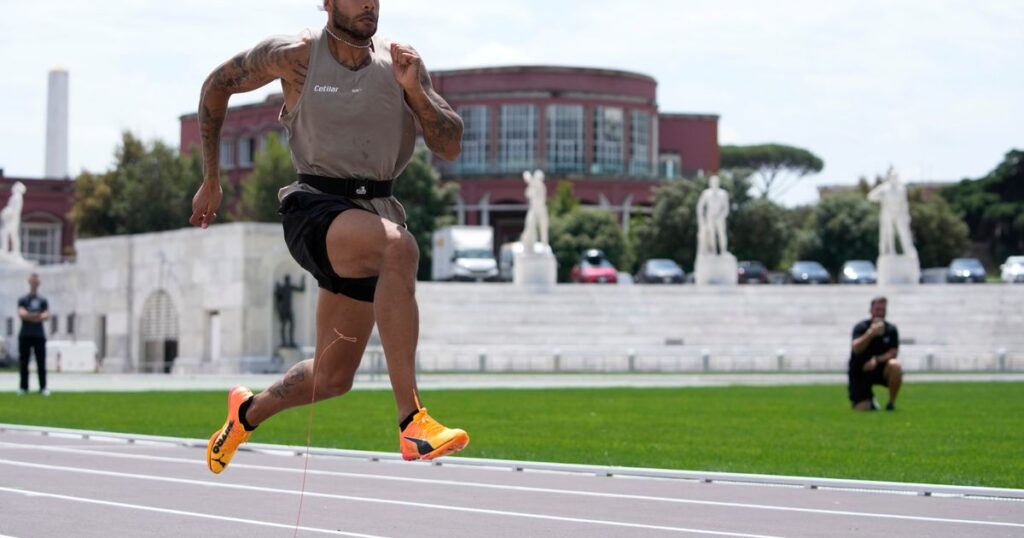ROME (AP) — Before Marcel Jacobs replaced Usain Bolt as the 100-meter gold medalist at the Tokyo Olympics, few people outside Italy had heard of him.
After three injury-plagued years, the Texas-born Italian remains as much of an enigma today as he was then.
American sprinter Noah Lyles won three gold medals at last year's world championships and is understandably all the attention heading into Paris. While many other runners have broken 10 seconds this year, Jacobs hasn't managed the mark in nearly two years.
That means Jacobs finds himself in the unusual position of being the defending champion and still the underdog in the biggest race of the Olympics.
“It's nice to be able to fly under the radar and be able to prepare and race without thinking about what other people think of me,” Jacobs told The Associated Press. “I don't have to win every race, but I would like to go to the Olympics and win again.”
The 29-year-old Jacobs has been plagued by a series of physical issues that have limited his win total over the past two years.
He withdrew from the semifinals at the 2022 World Championships with a thigh injury and missed the final at last year's world championships. He has also withdrawn from a number of other races and was once hospitalized overnight in Kenya with gastroenteritis.
Due to injuries and lack of results, Jacobs parted ways with his long-time coach, Paolo Camossi, who had been his mentor since his days as a long jumper, and moved to Jacksonville, Florida, to train with experienced coach Lana Ryder and elite sprinters such as Andre de Grasse, Trayvon Bromell, Jerome Blake and Abdul-Hakim Sani-Brown.
“That was the biggest thing,” Ryder said, “trying to figure out why he had so many injuries over the years. … So we had to peel back the onion and find the solutions. We found some issues that we could solve and we're working to get him 100 percent healthy.”
Health-wise, things have been going well so far: Jacobs has not had any physical issues in the four races he has raced since April.
But his results and times are still developing: 10.11 seconds in Jacksonville, Florida on April 27, 10.07 seconds in Rome on May 18, 10.19 seconds in Ostrava, Czech Republic on May 28, and 10.03 seconds in Oslo, Norway on May 30 – all far from the 9.80 seconds he won in Tokyo.
However, the time was not too far from Jacobs' results before the Tokyo Games.
Jacobs had never broken 10 seconds before the last Olympics and had only been just shy of that mark twice before going into Tokyo, which was one of the reasons why doubts were raised after he won gold.
“We talked a lot about the criticism, but he didn't really care. We didn't even have to address the doping and that sort of thing,” said his mental coach, Nicoletta Romanazzi, who Jacobs credits with helping him achieve his goal in Tokyo.
“Other items were more complicated, like helping him deal with all the changes (in his life),” Romanazzi added. “Success is scary.”
Jacobs became an instant celebrity in Italy after helping the team to success in Tokyo, where she also won gold in the 4×100 relay.
“That's the biggest change, right? When you become an Olympic champion, all of a sudden you win, so you never know what's going to happen,” Ryder said. “Athletes know how to go from zero to 100, but then they have to think, 'What is my agent going to do for me? What do the other guys around me have to do to protect me?' I think he's going to be very well protected in Jacksonville. He's training with other Olympic champions and superstars.”
Compared to the attention he gets everywhere in Italy, Jacobs gets very little attention in Florida.
And he's not the only one, Ryder pointed out.
“Nobody cares about track and field in the United States,” Ryder said. “There are people standing on the track who see us every day, and they have no idea who (the sprinters) are, who I am, so it's kind of funny.”
So what is Jacobs like outside the truck?
“He's just a family guy,” Ryder says. “He likes to go home and be with his kids and his wife. He's just in his own little world. I'll call him at night and he'll text me back and say, 'I'm with the kids, I'll call you later.' That's all he wants to do. He practices hard. We have a long day together and then he just wants to go home and be with his family.”
Up next is Jacobs' biggest pre-Olympic test, the European Championships on his home track in Rome, which start on Friday.
“I want to be fast in Paris,” Ryder said, “but I also want to be fast at home. I want to be European champion.”
The last time Jacobs broke the 10-second barrier was in August 2022 at the last European Championships in Munich, when he won in 9.95 seconds.
“The idea is to race a lot and bring all the different aspects together because I've basically overhauled my entire training plan,” Jacobs said, “so I need to race more to bring it all together.”
___
AP Paris Olympics coverage: https://apnews.com/hub/2024-paris-olympic-games

